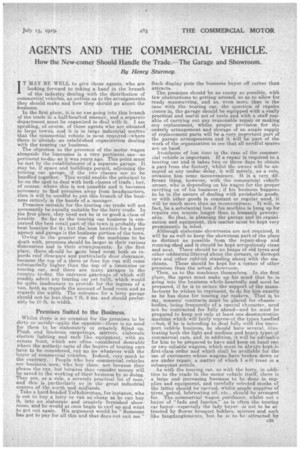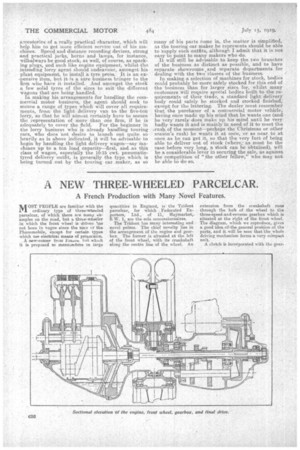AGENTS AND THE COMMERCIAL VEHICLE.
Page 13

Page 14

If you've noticed an error in this article please click here to report it so we can fix it.
How the New-comer Should Handle the Trade. The Garage and Showroom.
By Henry Sturmey.
IT MAY BE WELL to give those agents, who are looking forward to taking a hand in the branch of the industry dealing with the distribution of commercial vehicles, an outline as to the arrangements they should make and how they should go about the business.
In the first place, it is no use going into this branch of the trade in a fia,Ifsheafted manner, and a separate department must be organiSed to deal with it. I am speaking, of course, of those agents who are situated in large towns, and it is in large industrial centaes' that the commercial vehicle is most required—where there is'already an established organization dealing with the touring car business. _ The objection to the presence of the motor wagon alongside the limousine is a very pertinent one—as pertinent to-day as it was years ago. This point must he met by the establishment of a separate garage. It may be, if space and buildings permit, adjoining the touring car garage, if the two classes . are to be handled together. This would enable the principal to be on the spot to deal with both classes of trade ; but, of course, 'where this is not possible and it becomes necessary to 'find premises away from headquarters, then it will be needful to put this branch of the business entirely in the hands of a manager. Premises suitable for the touring ear trade will not necessarily be equally suitable for the lorry trade. In
the first place, they need not be in GO good a class or
locality. So far as the touring car business is concerned the best retail part of the town is probably the best location for it ; but the best location for a lorry agency and garage is the business portion of the town. Owing to the greater size of the machines to be dealt with, premises should be larger in their various dimensions and in their arrangements: In the first place, there should be wore head room both as regards roof clearance and particularly door clearance, because the top of a three or four ton sra.n will come
substantially higher than the top of a limousine or touring car, and there are many garages in the
country to-day, the entrance gateways of which will readily admit any touring car yet built, which would be quite inadequate to provide for the ingress of a van, both as regards the amount of head room and as regards the width. The entrance for a lorry garage should not be less than 7 ft. 6 ins, and should prefer ably be 10 ft. in width.
Premises Suited to the Business.
Whilst the is no occasion for the premises' to be dirty or untidy—quite the opposite—there is no need for them to be elaborately or ornately fitted up. Plush and linoleum carpetings, mirrors, elaborate electric lighting and such like equipment, with an ornate front, which are . often considered desirable where the esthetic taste of the buyers of touring cars have to be considered, cut no ice whatever with the buyer of commercial vehicles. Indeed, very Much to the contrary, People who hay commercial vehicles are business men, who buy them, net because they please the eye, but because they consider money will be saved in the working of their business by so doing. They are, as a rule, a severely practical lot of men,' and this is particularly so in the great industrial centres of the north and midlands.
Take a hard-headed Yolkshireman, for instance, who is out to buy a lorry or van as cheap as he can buy it, into an elaborate and ornately furnished showa room, and he would at once begin to curl up and want to get out again. His argument would be ' Someone has got to pay for all this and that does not suit me." Such display puts the business buyer off rather than attracts.
The premises shoulelSbe as roomy as possible, with few obstructions to getting around, so as to allow for ready rnanuvring, and as, even more than is the case with the touring car, the question of repairs comes in, the'garage should be equipped with a really practical and useful set of tools and with a staff capable of carrying out any reasonable repair or making any replacement, whilst proper provision for thu ,orderly arrangement and storage of an ample supply of replacement parts will be a very impartant part of the garage arrangements and it will be part of the work of the organization to see that all needful spares are on hand.
Avoidance of lost time in the ease of the commercial vehicle is important. If a repair is required to a touring car and it takes two or three days to obtain a part from the factory, whilst the owner will be annoyed at any undue delay, it will merely, as a rule, occasion him some inconvenience. It is a very different thing, however, with the commercial vehic/e owner, who is depending on his wagon for the proper carrying on of his business ; if his 'business ha,ppene to be in the nature of dealing with perishable goods. or with ether goods in constant or regular need, it will be much more than an inconvenience. It will, in fact, bea substantial loss if his machine is hung up for repairs one Minute longer than is humanly preventable. So that, in planning the garage and its organization and equipment, this matter must be kept very prominently in mind.
Although elaborate showrooms are not required, it will be as well to keep the showroom part of the place as distinct as possible from the repair-shop and running-shed and it should be kept scrupulously clean and neat. There should be no heaps of old tyres and other oddments littered about the corners, or decrepit cars and .other rubbish standing about with the machines. These should be kept for a corner of other premises than the actual showroom. Then, as to the machines themselves. In the first place, the agent must make up his mind that he is going into the business. whole-heartedly and must be prepared, if he is to seaure the support of the manufacturer he wishes to represent, to do for him exactly as he has done for touring car makers. That is to Say, seasons' contracts must be placed for chassis— bodies, being frequently of a special character, need not be contracted for fully ahead—and he must be prepared to keep not only at least one demonstration machine which will fairly represeut the types handled —but, if he is intending to deal fully with the transport vehicle business, he should have several, illustrating both the light and medium and heavy types of commercial cars, and, in addition, it will be advisable for him to be prepared to have and keep on hand one or two reliable wagons, which must be always kept in first-class order and which shall be available for the use of customers whose wagons have broken down or are under repair, a matter of which I will treat in a. subsequent article. As with the touring car, so with the lorry, in addition to the trade in the motor vehicle itself, there is a large and increasing business to be done in supplies and equipment, and carefully selected stocks of the latter should be carried, whilst ample supplies or tyres, petrol, lubricating Oil. etc., should be arranged for. The commereial wagon purchaser, whilst not a buyer of " fads and fannies,' as is often the touring car buyer—especially the lady buyer—is not to be attsacted by flower bouquet holders, mirrors and such like fangdanglements, but he is to he attracted by 8,7.ces4iories of a really practical character, which will help him to get more efficient service out of his machines. Speed and distance recording devices, strong and practical jacks, horns and lamps, for instance, willsalways be good stock; as well; of course, as sparking plugs, and such like engine equipment, whilst the intending lorry agent should endeavour, amongst his plant equipment, to install -a. tyre press. It is an ex-pensive item, but it is a sure business bringer to the firm who have itinstalled. And amongst the stock a few solid tyres of the sizes to suit the different wagons that are being handled. " In making his arrangements for handling the commercial motor business, the agent. should seek to secure a range of types which will cover all requirements, from the light delivery van to. the five-ton lorry, so that he will almost certainly have to secure the representation of more than one firm, if he is adequately to cover the field. For the beginner in the lorry business who is already handling touring ears, who does 'not desire to launch out quite so heavily as is above indicated, it will he advisable to begin by handlingsthe light delivery wagon—say machines up to a ton load capacity—firSt, and as this class of wagon, especially •the 10-15 cw:t. pneumatics tyred. delivery outfit, .is generally the type which is being turned out by the touring car maker, as so many of his parts come in, the matter is simplified,as the touring oar maker he represents should be able to 'supply such outfits, although I admit that it is not easy to point to many makers who do.
It. will still be advisable to keep the two branches of the business as distinct as possible, and to have separate showroon3s and separate departments for dealing with the two classes of the business.
In makinga selection of machines for stock, bodies could probably be-more safely stocked for this end of the -business than for larger sizes for, whilst many customers will require special bodies built to the requirements -of their trade, a standard light delivery body could safely be stocked and stocked finished, except for the lettering. The dealer must iemember that, the purchaser of a commercial -motor vehicle; having once made up his mind that he wants one (and he very' rarely does make up his mind until he very badly wants it and is mainly an need of it to meet the ..rush of the moments—perhaps the Christmas or other season's rush) he wants it at once, or as near to at once as he can' get it, so that the very factof being able to deliver out of stock (where,-.-as must be the case before very. Jong, a stock can be obtained), will be a considerable lever in securing the sale, as against the competition -of ",the other fellow," who may not be able to do so.






















